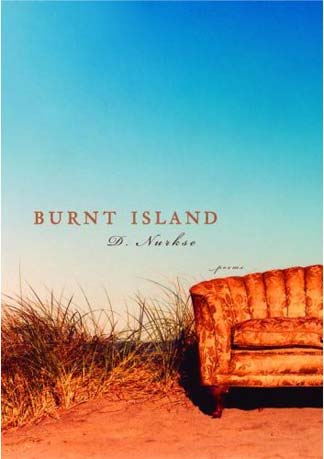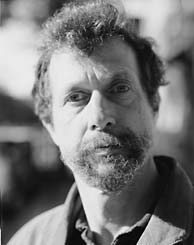|
Vol. 1, Issue #23 Dec. 8th - Dec. 21st, 2006
Book Review: Burnt Island by D. Nurkse
Nurkse speaks with fascinating clarity and conducts his lines fluidly. His tone would normally react into the reader an unattractive feeling, but by using simple and stylistic writing techniques along with vivid illustrations, the author provides a careful but hard pressed landscape. His short poems, often kept to one page, deliver strong glimpses into the strange, difficult fallacies about the world. The struggles the author brings to the table are shown and not insisted, giving the reader leeway to let the observations seep. Stoic acceptance comes to mind in October Rendezvous: “We saw the bodies jump Burnt Island resembles a disenchanted but thoughtful trek through past feelings, shown lyrically and with convincing accuracy. A reoccurring motif for his works here are in emotional dependency and lost companionship. This age-old poetic whine isn’t portrayed by the same themes in different words, but entirely different retention. His poems border heavy renunciation or, at the least, a shameless honesty toward himself and his attachments. At times the author provides a naked, matter a fact illustration toward relationships, like this excerpt from A Walk in Giovanna’s Park: “Lovers have to rest In A Hike to Little Falls, the author compares a relationship to an incubating egg. The growing thing meets conflict because sex ruins innocence: “Already it smelled of us Although Nurkse brings up the issues that push a Bob Saget-like embarrassing lump in the throat, they are brought on lightly and with a careful reproach that does not hurry the reader. Even when the author speaks allegorically, it is proposed directly, getting rid of those wink-thought monikers and symbols found in contemporary poetry. Norkse makes the book fruitful for the aloft scholars and the work class norm, and outside the themes, the author does not forget beauty in the sights, like in North of Althea: “Sheen of pollen in the arrow grass Nurkse dowses the book in effort, reflection and phonetic talent. Color is not lost to content. There is enough imagery in this book to fill the reader in thought for days. Burnt Island is a heartfelt proposition, inquisition and dissection of the difficulties often shrugged aside or misunderstood. At times Nurkse may slide into an overly critical representation, almost as though he refuses to give certain glows a chance because his conflict filter sifts it out. Herkimer: “Then we flew
Identifying and translating Burnt Island is not difficult, but it’s challenging themes are addictively invigorating. D. Nurkse has a refined way with words and plucks the most unexcavated attributes out of our nature. The author’s prose punctuates a fine, fluid and fascinating voice in poetry with a well practiced approach. Some of the best modern literature I’ve read has come from these pages. Alfred A. Knoph / New York 2005 / 114 Pages |
||
©2006 NONCO Media, L.L.C.

 It’s usually during the less confident times I go to the poetry shelf for a new read. This is where I found D. Nurkse’s Burnt Island, a 2005 released collection of poems with both extraordinary and fatal images that follow the author through his experiences. The progression through the pages evolves like age and depicts issues accordingly. Burnt Island is an expedition into the confrontations brought from failed relationships, fighting wars against uncivil man and concrete social precepts too hopeless to change. Somehow, as depressing as it sounds, the book contains deep felt answers and many more questions that rove over our shared uncertainty.
It’s usually during the less confident times I go to the poetry shelf for a new read. This is where I found D. Nurkse’s Burnt Island, a 2005 released collection of poems with both extraordinary and fatal images that follow the author through his experiences. The progression through the pages evolves like age and depicts issues accordingly. Burnt Island is an expedition into the confrontations brought from failed relationships, fighting wars against uncivil man and concrete social precepts too hopeless to change. Somehow, as depressing as it sounds, the book contains deep felt answers and many more questions that rove over our shared uncertainty. The author touches up on the ‘birth from death’ ideal throughout the book, but renews it enough to coax the reader into a place where suffering opens the way to a better life, unhinged from past mistakes. This renewed sight is the treasure Burnt Island offers. Nurske provides stunning portrayals devised inside internal conflicts and the need for constant renunciation. Certain poems develop in a biblical way that aim to rejuvenate the depressed reader. The author strives with a great fervor to find the honest implications behind every circumstance, and struggles even harder to find a complacent attitude through his turmoil.
The author touches up on the ‘birth from death’ ideal throughout the book, but renews it enough to coax the reader into a place where suffering opens the way to a better life, unhinged from past mistakes. This renewed sight is the treasure Burnt Island offers. Nurske provides stunning portrayals devised inside internal conflicts and the need for constant renunciation. Certain poems develop in a biblical way that aim to rejuvenate the depressed reader. The author strives with a great fervor to find the honest implications behind every circumstance, and struggles even harder to find a complacent attitude through his turmoil.